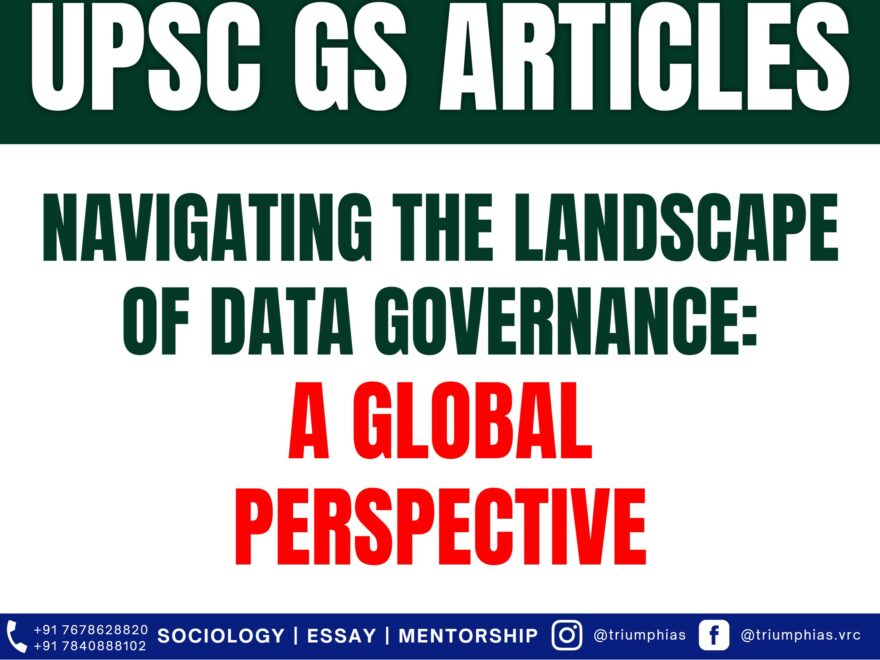Need for Data Protection Laws
(Relevant for General Studies paper Prelims/mains)

Data Governance: In the era of digital advancements, the gathering and analysis of personal data have become crucial for communication and transactions in the digital landscape. However, the potential for the misuse and exploitation of digital technologies has sparked considerable apprehension regarding the safeguarding of personal information. The General Data Protection Regulation (GDPR) implemented by the European Union serves as a notable model for a robust data protection framework.
India, too, has been proactive in enhancing its data governance measures through various initiatives, including the Digital Personal Data Protection Bill and the Information Technology Act (IT Act) of 2000. Additionally, India intends to introduce the Digital India Act, which will replace the existing IT Act of 2000, further reinforcing its data protection regulations.
Regulations Regarding Data Governance
- The General Data Protection Regulation (GDPR) aims to establish a comprehensive legal framework for the processing of personal data. Within the European Union (EU), privacy rights are fundamental, aiming to safeguard an individual’s dignity and their control over the data they generate.
- The substantial fines imposed by the GDPR have compelled organizations worldwide to prioritize compliance. Prominent companies like Google, WhatsApp, British Airways, and Marriott have faced significant penalties as a result.
- Furthermore, the GDPR’s stringent regulations concerning data transfers to third countries have had a far-reaching impact on data protection frameworks beyond the EU.
- In contrast, the United States lacks a comprehensive set of privacy rights or principles akin to the EU’s GDPR that specifically addresses the use, collection, and disclosure of data. Instead, there are limited sector-specific regulations, and the approach to data protection differs between the public and private sectors.
- The government’s activities and powers regarding personal information are well-defined and covered by broad legislation such as the Privacy Act and the Electronic Communications Privacy Act. On the other hand, the private sector is subject to certain sector-specific norms.
- Over the past two years, China has introduced new laws on data privacy and security. Notably, the Personal Information Protection Law (PIPL), which took effect in November 2021, grants Chinese data subjects new rights and aims to prevent the misuse of personal data. The Data Security Law (DSL), implemented in September 2021, requires the categorization of business data based on importance levels and imposes additional restrictions on cross-border data transfers.
Challenges with Data Governance in India
- One of the main challenges in ensuring data protection in India arises from a limited understanding among individuals and organizations regarding the importance of safeguarding data and the potential risks associated with data breaches. As a result, individuals may face difficulties in implementing the necessary measures to protect their personal information.
- The existing legal framework concerning data protection in India lacks strong mechanisms for ensuring compliance. This deficiency makes it challenging to hold organizations accountable for data breaches and for failing to comply with data protection regulations.
- A significant hurdle in the implementation and enforcement of data protection regulations in India is the absence of standardized practices among organizations. The lack of consistency in data protection protocols poses challenges when establishing and adhering to uniform data protection practices.
- The current data protection framework in India does not provide sufficient safeguards for sensitive data, such as health data and biometric data. As organizations increasingly collect these types of data, the lack of adequate protection measures becomes a concern.
Achieving a balance between innovation and regulation holds significance. While it is important to have strict regulations to protect personal data, excessively rigid and constraining standards could impede innovation and obstruct the smooth flow of data across borders. It is crucial to find the appropriate equilibrium that promotes innovation while ensuring effective protection of personal data.
To master these intricacies and fare well in the Sociology Optional Syllabus, aspiring sociologists might benefit from guidance by the Best Sociology Optional Teacher and participation in the Best Sociology Optional Coaching. These avenues provide comprehensive assistance, ensuring a solid understanding of sociology’s diverse methodologies and techniques.
Data governance, GDPR, personal data, privacy rights, data protection, data security, digital technologies, Information Technology Act, Digital Personal Data Protection Bill, data breaches, data transfer, privacy regulations, data protection in India, digital innovation, Best Sociology Optional Teacher, Best Sociology Optional Coaching, Sociology Optional Syllabus.
Follow us :
🔎 https://www.instagram.com/triumphias
🔎https://www.youtube.com/c/TriumphIAS
https://t.me/VikashRanjanSociology
Find More Blogs
|
Scope of the subject and comparison with other social sciences |
|||
|
|
|
|
Modernity and social changes in Europe |



One comment